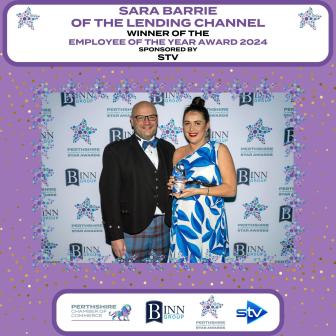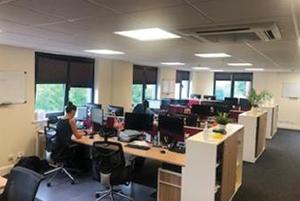Commercial Property Financing: A Step-by-Step Guide for Business Owners
Having your own space for your business is a huge achievement for any entrepreneur. However, to make this happen, you need to apply for proper financing to secure your dream property. This is where commercial mortgages becomes necessary.
At The Lending Channel, we're fully knowledgeable about the process of securing commercial mortgages in Scotland. We know how complex this process is, that's why we're here to guide you every step of the way. This detailed blog will walk you through the essential steps on how you can successfully obtain the financing your business needs.
Applying for mortgages doesn't need to be stressful, especially for those navigating this process for the first time. Let's simplify this exciting journey by reading our comprehensive guide below!
Why invest in commercial property?

Investing in a commercial property can bring substantial benefits to your business. Whether you're looking to secure your first premises, expand your operations, or diversify your portfolio, owning a commercial property gives you a level of control and security that leasing can't match. Here are the benefits it provides:
-
No more lease renewals: When you own a commercial property, it eliminates the issues and difficulties that come with lease renewals. As a property owner, you're now you're own landlord. Therefore, you will not be subject to rental increases and new terms any more. This stability allows you to plan long-term strategies with confidence to make sure your business continues to operate smoothly.
-
Cost-effective in the long-term: Purchasing a commercial property may seem costly at first. Over time, having your own property can be more cost-effective than leasing since you're building equity in the property and avoiding the rising costs of rent. This equity can be a valuable asset for your business that can provide financial security and potential for future growth.
-
Option to refinance property: Owning a commercial property gives you the flexibility to refinance, allowing you to access the equity built up in the property. Refinancing can be an effective way to free up capital for business expansion, renovations, or other investments. This way, you can have more control over your financial resources.
-
Freedom to manage the property: As the owner, you have the freedom to manage and modify the property to suit your business needs without needing approval from a landlord. This autonomy means you can customise the space, undertake renovations, and make long-term improvements that enhance the functionality and value of the property.
-
Additional income stream: If your property has more space than you need, subletting part of it can create an additional income stream for you. This can help offset the costs of ownership and provide financial flexibility, especially during periods when your business may require additional liquidity. Subletting also maximises the use of your investment to make sure that no part of the property goes to waste.
Understanding commercial property mortgages
A solid understanding of commercial mortgages is important for business owners and entrepreneurs, particularly those whose looking to buy their first commercial property for their business. At its core, a commercial mortgage is a type of loan available to businesses looking to purchase properties intended for business use.
Unlike residential mortgages, which cater to homebuyers, commercial mortgages target investors and entrepreneurs looking to invest in income-generating properties.
What types of property can commercial mortgage be used on?
Commercial mortgages cover a variety of property types. Understanding the versatility of this financial tool is crucial for businesses seeking to leverage it for strategic growth.
.png)
Let’s explore the types of properties that commercial mortgages can be applied to:
-
Hotel and public house
-
Factory or warehouse
-
Investment properties and portfolio mortgages
-
Nursing and care home
-
Office premises/retain unit
-
HMO mortgage
What are the benefits of commercial mortgage?
Commercial mortgages have a myriad of benefits, each playing a pivotal role in the success of your business:
-
Property acquisition and expansion: Commercial mortgages empower businesses to acquire or expand their physical footprint. Whether you aim to purchase a new office space, retail store, or industrial facility, this financial tool provides the means to secure prime locations for your operations.
-
Tax deductions: Unlike some other forms of financing, interest payments on commercial mortgages are often tax-deductible. This presents a valuable opportunity for businesses to optimise their financial structure and reduce overall tax liabilities.
-
Wealth accumulation: Commercial properties have the potential to appreciate over time, contributing to the accumulation of wealth for business owners. As the property value increases, so does the overall financial health of the business.
-
Stability and control: Owning the property where your business operates provides a sense of stability and control. It eliminates concerns about lease renewals, rental increases, or restrictions on property use, offering a secure foundation for long-term business planning.
-
Flexible loan terms: Tailored to the unique needs of businesses, commercial mortgages offer flexibility in loan terms that align with your financial goals and operational requirements.
How to assess the value and potential of a commercial property
Before investing in a commercial property, it's essential to first evaluate its value and potential. Proper assessment guarantees that you are paying a fair price and aligns with your business objectives.
To make a smart decisions, it's crucial to know the factors that influence a property's value and the various methods to use for assessment.
Factors influencing commercial property value

There are several factors that affect the value of a commercial property. Here are some aspects to consider:
Location
If you've heard the phrase "location, location, location", then you're already aware that location is the most critical factor in determining the value of a commercial property.
For example, properties situated in prime areas with accessible transport links, high customer footfall, and proximity to other establishments tend to command higher prices.
Physical characteristics
How the property looks also impacts its value. This includes the size and condition of the business premises. Properties that are well-maintained, modern, and versatile usually have higher market value and appeal to potential buyers.
Market conditions
Learning about the current broader economic climate and specific market conditions is vital before purchasing a property. Factors such as interest rates, economic growth, and demand for commercial space can either increase or decrease property values.
Ways to assess and calculate commercial property value
Assessing the commercial property value is a good strategy before finalising your purchase. Here are two ways you can calculate it:
Income approach
The income approach values a property based on the income it generates or is expected to generate in the future. This approach is particularly useful for rental properties or commercial buildings designed to produce income.
Formula:
Property Value = Net Operating Income (NOI) / Capitalisation Rate (Cap Rate)
-
Net Operating Income (NOI): The income generated by the property after operating expenses are deducted. It does not include taxes, financing costs, or depreciation.
NOI = Gross Rental Income − Operating Expenses
-
Capitalisation Rate (Cap Rate): The rate of return expected on the investment property.
Cap rate = NOI / Purchase Price
For example, let's say the property you're looking to buy is expected to generate £500,000 annual rental income and the annual operating expenses is £300,000. The NOI will be £200,000. To get the cap rate, let's assume that the purchase price is £1,000,000. When we divide it by the value of NOI, the cap rate will be 0.2.
GRM (Gross Rent Multiplier) Approach
The Gross Rent Multiplier (GRM) is a quick method to estimate a property’s value based on its rental income.
Formula:
Property Value = Gross Rental Income × GRM
-
Gross Rental Income: The total annual income from renting out the property.
-
GRM: A multiplier derived from comparable properties. It’s calculated by dividing the sale price of a comparable property by its gross rental income.
For example, you're planning to purchase an office space with a sale price of £700,000 and annual gross rental income of £50,000. To calculate its GRM, you need to divide 700,000 / 50,000. The GRM is 14. This represents how many years it would take for you to pay off the property.
Steps to secure financing for commercial property purchases
Securing a funding for your commercial property can be challenging. With the right preparation and guidance, the process can be smooth and efficient. Here are the key points to follow to ensure you are well-prepared and positioned for success.

Maintain a good credit score
Your credit score is one of the first things commercial mortgage lenders will check when assessing your loan application. A high credit score means that you are a reliable borrower and assures lenders that you can settle monthly repayments on time.
To maintain or improve your credit score, consistently pay your bills on time, manage your debts wisely, and regularly review your credit report.
Prepare necessary documents
When applying for a loan, lenders will ask you for a comprehensive set of documents to assess your financial health and the viability of your business. These documents include:
-
Credit report
-
Personal and business financial statements
-
Personal and business tax returns for the last 2-3 years
-
Property appraisal reports
-
Business plans and projections
-
Other legal documents ( e.g. incorporation papers)
Having these documents organised and readily available can speed up the application process and demonstrate your professionalism to potential lenders.
Develop a solid business plan
A well-crafted business plan shows the profitability and feasibility of your business. Your plan should clearly outline your business goals, strategies to achieve these goals, and detailed financial projections.
Having a strong business plan demonstrates how sustainable your business is, which increases your chances of loan approval.
Select appropriate property
The property you choose can make or break your business and your loan application. It should meet your business needs, be in a desirable location, and hold good market value. Well-maintained properties and those located in attractive areas are more likely to appraise higher, which increases your chances of securing the necessary financing.
Make sure to conduct thorough research to select the right property for your business.
Seek advice from a reliable mortgage broker
Navigating the world of commercial property financing can be complex, and partnering with a trusted mortgage broker can make a difference.
A commercial mortgage specialist can provide your expert guidance, help you understand your financing options, and assist in finding the best load products for your needs. Their expertise can simplify the application process and enhance your chances of securing favourable loan terms.
Send your application
Once everything is prepared - necessary documents, strong business plan, and appropriate property - it's time to submit your loan application. Double-check your application to avoid missing any information that could delay the process.
Present case confidently and show the preparedness and strength of your lending application.
Wait for the approval
After submitting your application, the lender will review your application. This process can take some time, so it's important to be patient. While waiting for the results, just be prepared to provide any additional information in case the lender asks.
Once approved, you will be one step closer to securing the commercial property that will drive growth and success to your business!
Legal considerations for commercial property buyers
When purchasing a commercial property, there are legal considerations that should take into account for the success of your investment. Ensuring all legal requirements can protect your business interests and provides you with peace of mind.
Let's explore the key considerations that every commercial property buyer should address:
-
Real estate solicitor: A qualified real estate solicitor can guide you through the legal complexities of the transactions to make sure that your interests are protected at every stage. From reviewing contracts to conducting necessary searches, a solicitor's expertise can help you avoid potential legal pitfall and ensure smooth purchase process.
-
Contractual agreements: Carefully reviewing and understanding contractual agreements is crucial since it involves the terms of the sale, the obligations of both parties, and the legal rights you acquire with the property. Your solicitor will assist in negotiating agreeable terms and ensuring that all clauses are fair and coincide with your business goals. Paying close attention to these contracts can prevent disputes and unexpected liabilities in the future.
-
Due diligence: Due diligence is the time when the buyer is given the opportunity to meticulously inspect the property before signing the contract. This process involves confirming property title, performing property inspections, and conducting property survey. Due diligence is fundamental when buying a property since you can identify potential risks or issues that can affect the property's value during this period.
-
Licences and permits: Depending on the nature of your business, you may need to obtain specific licences and permits to operate from the commercial property. These could be business licenses, health and safety permits, or environmental approvals. It's necessary to identify and secure these permits before finalising your purchase.
-
Stamp duty and taxes: Purchasing a commercial property in the UK comes with specific tax obligations. This includes Stamp Duty Land Tax (SDLT) - a tax that buyers in the UK have to pay when their purchased property exceeds a certain threshold. In Scotland, the equivalent of this tax is the Land and Buildings Transaction Tax (LBTT). When buying a property, you should also factor in these costs in your budget.
Expert advice: Navigating the commercial property market
As a mortgage solutions provider in Scotland and the UK since 2010, we understand how challenging it can be to navigate the commercial property market. For business owners and entrepreneurs like you, having the right approach and expert advice can help you enter the market confidently and successfully.
Here are some practical tips you can do:
Conduct thorough market research: Having good knowledge on the market you're entering is crucial. Take time to research the local property market trends, rental yields, vacancy rates, and future development plans in the area. This information will provide valuable insights into potential property values and investment returns.
Define your investment goals: Before diving into the market, clearly define your objectives. Are you looking to expand your business, generate rental income, or invest for capital growth? Your goals will influence the type of property you should target and the financing options that best suit your needs.
Build a reliable network: Having a trusted network of professionals—such as real estate agents, solicitors, mortgage brokers, and financial advisors—can make the process smoother. These experts can offer guidance, provide essential services, and help you navigate the legal and financial aspects of commercial property investment.
Understand the financial commitment: Entering the commercial property market requires a significant financial commitment. Make sure that you're aware of all associated costs, including loan repayments, maintenance, and other fees. It's also wise to have a financial buffer to cover unexpected expenses.
Be patient and strategic: The commercial property market can be unpredictable, so patience and strategic thinking are key. Avoid rushing into decisions, and take the time to thoroughly evaluate each opportunity. A well-considered approach will increase your chances of making a successful investment.
FAQs: Common concerns about commercial property financing
What are the key differences between commercial and residential property financing?
Commercial loans are typically used for properties intended for business use, such as offices, retail spaces, or warehouses. On the other hand, residential loans are designed for purchasing homes or properties where individuals live. Commercial loans often have higher interest rates, shorter loan terms, and require a larger deposit compared to residential loans.
How does the loan-to-value (LTV) ratio affect my commercial property financing options?
The Loan-to-Value (LTV) ratio represents the percentage of the property’s value that a lender is willing to finance. For example, an 80% LTV means the lender will finance 80% of the property’s value, requiring you to provide the remaining 20% as a deposit. A lower LTV generally means lower risk for the lender, which can result in more favourable mortgage terms for the borrower, such as lower interest rates.
Can I use a commercial mortgage to refinance an existing loan on my property?
Yes, you can use a commercial mortgage to refinance an existing loan on your property. Refinancing can be a strategic move to lower your interest rate, reduce monthly payments, or access equity for further investment in your business.
What are the typical commercial mortgage rates, and how are they determined?
The amount of interest for commercial property loans in the UK can vary depending on several factors, including the lender, the type of property, the loan amount, and the current economic climate. By the second quarter of 2023, the average weighted rate loans had climbed to 4.56 percent, almost tripling from the rate observed in the fourth quarter of 2021.
What happens if I default on my commercial property loan?
If you default on your commercial property loan, the lender has the right to take legal action to recover the outstanding debt. This often involves repossessing the property used as collateral for the loan and selling it to recoup the owed amount.

Stay informed with The Lending Channel: Your partner in commercial property financing
Going through commercial property financing doesn’t have to be overwhelming. At The Lending Channel, we’re here to provide the expert guidance and tailored mortgage solutions you need to make informed decisions and achieve your business goals. You can also use our commercial mortgage calculator to check how much you can borrow.
Stay connected with us for the latest insights, tips, and updates on commercial mortgages. Whether you’re ready to explore your financing options or have specific questions, our team is just a call away. Contact us today to discuss how we can support your commercial property journey!




.jpg)

.png)
























